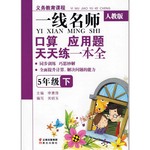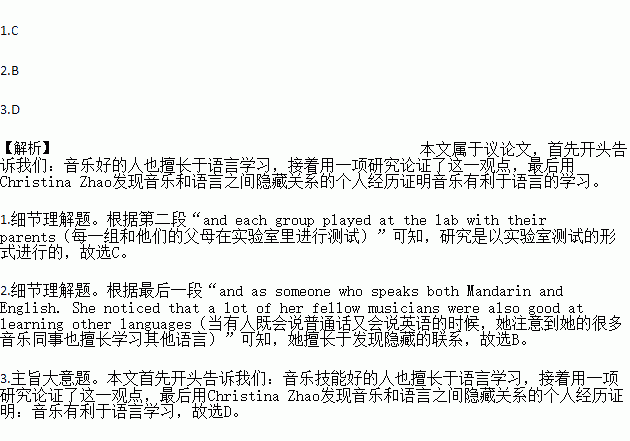题目内容
While music has value all by itself, researchers have long noticed that musicians also tend to be better at learning languages and show other improved reading and math abilities. Now a new study from the University of Washington by Christina Zhao shows that rhythm is an important bridge between music and speech as early as nine months of age.
Researchers randomly placed babies into two groups of 20 each, and each group played at the lab with their parents for a dozen 15-minute sessions over a month.
In one group, researchers played recordings of songs with a waltz rhythm and showed the parents how to help their babies tap out that 1-2-3 beat in time with the music on boy drums or with their feet. In the other group, children played with typical toys and no music.
The babies in the music group were better able to detect random mistakes in that rhythm when they heard it within two weeks of the last session. They also showed a stronger brain response to disruptions in the rhythm. For example, researchers would sometimes alter the timing of syllables(音节) by slightly shortening the middle sound of a word like bibbi to make it bibi—and the babies with music training were more likely to notice it.
In other words, music training not only improved the babies’ ability to notice when a musical rhythm skipped a beat, but also improved their ability to notice when the rhythms of speech changed unexpectedly, an important skill for learning to talk.
The study reflects Zhao’s personal experiences as a pianist who music in college, and as someone who speaks both Mandarin and English. She noticed that a lot of her fellow musicians were also good at learning other languages. “That really got me wondering how these two are related, “Zhao said.
1.What can we learn about the new study?
A. It included twenty babies.
B. The babies were grouped by age.
C. It was carried out in form of lab tests.
D. The two groups were offered different types of music.
2.According to the last paragraph, Christina Zhao ________.
A. will carry on with this study
B. is good at discovering hidden connections
C. is willing to share her personal experiences
D. began learning different languages during childhood
3.Which is the best title for the text?
A. Music Learners’ Advantages Over Language Learners
B. An Important Bridge Between Music and Babies
C. Researchers Prove Music’s Influence on Babies
D. Music Skills May Help Babies Learn Languages
 新课标同步训练系列答案
新课标同步训练系列答案 一线名师口算应用题天天练一本全系列答案
一线名师口算应用题天天练一本全系列答案
